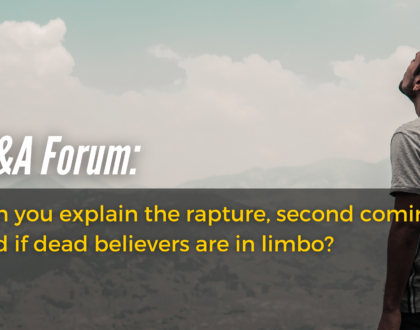10 Unpopular things Jesus said

by Westminster
You can listen to the audio version above or read on…
This is the second of a two-part post and podcast about things Jesus said, both popular and unpopular.
Part 1 was about the popular statements (you can read it by clicking here). This one is about the un-popular.
But why am I doing this?
It’s about looking not only at the words of Jesus, but into the mirror. Do we like following a certain version of Jesus—a photo-shopped Jesus who highlights what we like and crops out what we don’t—or the Jesus of Scripture?
Kyle Idleman came up with the term “Mesus.”[i] It’s when we project the things we like about ourselves onto Jesus—and only those things. It’s a Jesus who looks more like “me” than him—hence the term Me-sus. Instead of transforming ourselves to look more like him, we transform him to look more like us. It’s turning Jesus into a poster child for the beliefs and values we already have.
Are we following the Lord, or are we following ourselves in a Jesus t-shirt?

It’s a temptation for all of us, myself included. From what I’ve seen, many people have a “Bible within a Bible,” meaning that they selectively prioritize certain passages over others.
What I’ve discovered is that you can learn a lot about where you need to grow by being honest about what you tend to avoid. If you avoid the passages about grace and love, is it because you’re overly legalistic and self-righteous? If you avoid the passages about truth and obedience, is it because you’re easily swayed by the currents of our culture?
All of this begs a question, preserved here as a short poem:
Is to listen to some of what Jesus says
And not to all of what Jesus says
To not listen to what Jesus says?
Before we begin, let me just say one last thing. It was difficult to narrow the list down to just ten. I started with more than twenty. I then cut it down to fifteen. Getting to ten was exceedingly hard. But alas, success.
Speaking of self-awareness, I should tell you that the list I’m about to share with you isn’t the result of a formal survey. I’m simply highlighting what I’ve personally read and observed. Feel free to send in what you think I’ve missed!
Here are the ten in no particular order. I’ll list them, provide some commentary, and then bring it all together at the end.
#1 – If anyone comes to me and does not hate his own father and mother and wife and children and brothers and sisters, yes, and even his own life, he cannot be my disciple. (Luke 14:26)
When I was young I recall hearing a sermon about this verse titled, “Things I wish Jesus hadn’t said.” The preacher was certainly being honest!
Like many other passages, we need to know the context to understand Jesus’ meaning. He was teaching about the cost of following him. By this point in his ministry the crowds were large and he wanted them to know what they were getting into.
Jesus’ use of the word “hate” is hyperbole (exaggeration for effect). Before you conclude that I’m just squirming my way out of a difficult text, listen to the logic. Jesus’ elsewhere teaches people to honour their parents (Luke 18:20), and he himself ensured that his own mother would be taken care of after he died (John 19:27).
From this we see what Jesus was doing. He was using a common teaching tool to make an important point: in his footsteps, our love and commitment to God will be such a priority that our love for our own biological family will pale in comparison.
#2 – Do you think that I have come to give peace on earth? No, I tell you, but rather division. (Luke 12:51)
Much is made about the peace Jesus offers. And that’s a good thing. When he was born in Bethlehem the angels declared to the shepherds that he would bring peace (Luke 2:14). He fulfilled the prophecy in Isaiah 9:6 as the “Prince of Peace.” Through faith he gives us peace and forgiveness with God (Romans 5:1).
So what in the world did he mean about bringing division?
This statement is not unrelated to the first about family. In this passage from Luke’s Gospel Jesus goes on to explain that he will be the source of disagreement and division in households: “father against son and son against father” and “mother against daughter and daughter against mother.” He also cites in-laws.
All of this would have been very potent in a time when your identity, status and purpose were so closely aligned with your biological family.
When Jesus told people they needed to be “born again” in John 3:3, he was telling them that they needed to totally re-orient their lives: their identity, status and purpose now came from somewhere (and Someone) else. While still honouring our parents, following Jesus will mean that priorities need to be set.
#3 – I am the way, and the truth, and the life. No one comes to the Father except through me. (John 14:6)
I almost put this on the list of the most popular statements. A lot of people quote it in a favourable way, myself included. Jesus is the way, his is the very truth of God, and he is most certainly the source of abundant and eternal life. All good things!
The part which makes some people uncomfortable is the second half of the verse: “No one comes to the Father except through me.” In an age of near-crippling political correctness, Jesus teaches exclusivity, sort of. I say ‘sort of’ because he is exclusively inclusive. Let me explain.
Everyone who puts their faith in him will be given eternal peace with his heavenly Father (God). That’s the inclusive part, and it’s always been exceedingly good news. Regardless of your background, social status, or laundry list of moral failures, the arms of God are wide open in Christ.
So many religions are about earning some sort of moral standing with God. ‘Am I good enough? Have I achieved enough?’ Although we are certainly called to grow in holiness, we are made right with God through what Christ has done, not through what we have done.

At the same time, Jesus is the only door and path. That’s the exclusive part. All paths do not lead to God. Only Jesus does.
This isn’t the only place this sort of thing is mentioned. Just check out Matthew 10:32-33 or John 3:18.
God is always good, wise, holy, loving and true. He is never not those things. So in a chaotic and confusing world he provides clarity and compassion. Praise be to God that he cared (and cares) so much that he came to us personally, showed us the door, opened the door, and led us through the door.
It’s not loving to lie. And Jesus doesn’t.
#4 – You heard me say to you, ‘I am going away, and I will come to you.’ If you loved me, you would have rejoiced, because I am going to the Father, for the Father is greater than I. (John 14:28)
In my experience, people tend to get awkward when they come to this verse. ‘If Jesus is supposed to be both fully divine and fully human, why does he say his Father is ‘greater’ than he is? Doesn’t this just confirm that he’s only human?’
Various Bible passages highlight Jesus’ divinity, and several highlight his humanity. With respect to his divinity, he identified himself with the God of Israel and did things only the God of Israel can do. (You can read my longer post called ‘Did Jesus say he was God?’ here.) With respect to his humanity, he was born from a woman, grew in wisdom and stature, experienced pain, hunger and even cried.
Fair enough, but what is going on in John 14:28?
Jesus is equal to his heavenly father in essence, nature and character. But God the Father has a “greater” function or office. Norman Geisler and Thomas Howe provide an illustration. We sometimes say that the president of a country is a “greater” man than so-and-so. This is a reference to the nobility of their office (or function), not because there is anything “better” or “higher” in the individual themselves.[ii] I think that’s a helpful way to understand Jesus’ statement in John 14:28, especially considering his other statements and actions about his divinity.
#5 – Then he will say to those on his left, ‘Depart from me, you cursed, into the eternal fire prepared for the devil and his angels. (Matthew 25:41)
Some people have latched on to the idea that Jesus is “meek and mild”—and only meek and mild. Combine that oversimplification with the (unpopular) idea of hell, and passages like one this tend to be glossed over or altogether ignored.
The reality, however, is that Jesus taught about judgement and hell a lot. According to one count, 13% of his teachings were on the subject.[iii]
In the Sermon on the Mount, Jesus encouraged his followers to take the narrow road. Most people will take the road to destruction, he said, but only a few will take the narrow path to life. (Matthew 7:13-14.)

It would be one thing if hell were only reserved for people who were really, really evil like Hitler. But it’s not. According to Jesus’ words in Matthew 13:41 it’s for “all causes of sin and all law-breakers…” That’s a very big category!
The good news is that Jesus himself provides the remedy and rescue! (See the previous discussion about John 14:6, and spend some time prayerfully pondering one of the verses from the first post and podcast, John 3:16).
#6 – But she came and knelt before him, saying, “Lord, help me.” And he answered, “It is not right to take the children’s bread and throw it to the dogs.” (Matthew 15:25-26)
Here’s the context. A Canaanite woman came looking for help. For the record, that means she was a non-Jew. Her daughter was demon-possessed and suffering. She cried out to Jesus.
The disciples urged Jesus to send her away. He also seemed disinclined to help, stating that he was sent only to the lost sheep of Israel. In other words, he came first to God’s chosen people—and she wasn’t one of them. His mission did in fact extend beyond Israel (as we see in Matthew 28:18-20), but that time had not yet fully come.
Nevertheless, the woman kept pleading. And that’s when Jesus said the unpopular statement in verses 25 and 26: “It is not right to take the children’s bread and throw it to the dogs.” Did Jesus just call this suffering woman a dog? The statement would have been even harsher then than now. Today we think of dogs as household pets. Back then they were (often) scavengers, like racoons.
The woman was undeterred. In fact, she agreed: “Yes, Lord, yet even the dogs eat the crumbs that fall from their masters’ table.” She persisted by using Jesus’ own analogy. In so doing, she demonstrated humility and faith.
It worked. And Jesus immediately healed her daughter.
In this story, Jesus was testing her faith. She had called out to him as the “Son of David” (verse 22). That was a title associated with Israel’s Messiah, God’s chosen king and representative on the earth. Was she just a pretender, or did she truly believe?
Her persistence and humility provided a lasting example to both Jews and non-Jews of God’s power in the lives of those who truly believe, regardless of their background.
#7 – For from within, out of the heart of man, come evil thoughts, sexual immorality, theft, murder, adultery, coveting, wickedness, deceit, sensuality, envy, slander, pride, foolishness. All these evil things come from within, and they defile a person. (Mark 7:21-23)
There is sin within. Jesus calls the above list “evil things.” That’s serious stuff.
There are no virtues on that list. It includes “sexual immortality.” In Greek, it’s a single word, “porneia.” It’s where we get our modern English word “pornography.”
In context, and based on its use in Jesus’ day, Sam Allberry explains that this word was “something of a catch-all term for any sexual activity outside of marriage.”[iv] And by “marriage” is meant male-female marriage, a pattern Jesus consistently affirms whenever he is asked about it.
Various modern movements seem to want to enlist Jesus for their own purposes. I’ve seen it happen at both pro-gun rallies and pride parades. From what I’ve witnessed, some of these people seem to be well-meaning, but I’m not convinced they’ve done the background research.

As it relates to this verse and others like it (not to mention Paul and other biblical writers), the idea that Jesus would have been the least bit permissive when it comes to sexual ethics or marriage is simply not consistent with his words or actions.
#8 – For he was saying to him, “Come out of the man, you unclean spirit!” (Mark 5:8)
This statement isn’t specifically unpopular, but it is representative of a larger aspect of Jesus’ ministry which is: exorcising demons.
Many people in the modern west have downplayed or ignored the reality of spiritual warfare. They naively conclude that what the New Testament calls demon possession is simply misdiagnosed mental illness. ‘Those ancient people just didn’t know better,’ they say.
I think this dismissive attitude plays right into Satan’s hand. It was the French poet Beaudelaire who said that the Devil’s greatest trick is to convince us he doesn’t exist.

Is he around every corner? No.
Are he and his workers fictional? Also no.
True, there are hucksters and suckers. And yes, some people have unfortunately (and wrongly) concluded that all mental illness is demonic oppression. But none of that means that there aren’t legitimate cases of oppression.
People all over the world continue to open doors to the demonic in their lives—usually through tampering with the occult, Satanism, or by participating in serious evil—and so the deception and suffering continues.
If Jesus took seriously the reality of demons (also often called ‘unclean spirits’), why don’t we? A major component of his ministry was exorcism.
Deliverance ministries continue to exist in some churches today, but aren’t talked about very much. Fortunately, more and more attention is being given to the ways people are being helped from these sinister afflictions. This is highlighted in the recent book by Dr. Richard Gallagher called ‘Demonic Foes.’ Dr. Gallagher is a board-certified psychiatrist, professor of psychiatry, and leading psychiatric expert (globally) who is frequently consulted to discern cases which may require exorcism.
#9 – Jesus said to him, “If you would be perfect, go, sell what you possess and give to the poor, and you will have treasure in heaven; and come, follow me.” (Matthew 19:21)
A man approached Jesus and asked him what he must do to inherit eternal life. Jesus directed him to the commandments. ‘Done!’ the man replied. (I’m paraphrasing.)
That’s when Jesus told him to sell his possessions, give them to the poor, and then follow him. The man left. He was sad “because he had great wealth.”
The point of the story is to show how wealth can rival God for our ultimate allegiance. Having said that, I know people who have ‘lots’ of money but who still use it in good and God-honouring ways. It does not control them.
But I think that what makes most people uncomfortable about this verse is the idea of selling all of one’s possessions. For the man in the story, his possessions had clearly become a barrier between him and God. Therefore, Jesus prescribed a certain remedy. Maybe you need it too.

Either way, and whatever your personal barrier, we can’t get around the many passages which prioritize material generosity from Christians. Since God has so richly blessed us, we should be blessing others with a level of generosity that is often surprising.
#10 – And if your eye causes you to sin, tear it out and throw it away. It is better for you to enter life with one eye than with two eyes to be thrown into the hell of fire. (Matthew 18:9)
Much like the previous verse, when something stands in the way of Christlikeness we need to take action.
Many people—and even many Christian traditions—have begun downplaying sin. We pat it on the head and convince ourselves that the little brat isn’t a beast, just a misguided nuisance who doesn’t really matter because hey, none of us are perfect.
Um, not quite.
Much like the verse about hating your father and mother, Jesus is using hyperbole when he says to pluck out your sinning eye. Otherwise, every single one of us would be walking around with bloody faces and eyepatches.
In context, Jesus was teaching about having the humility and faith of a child in God’s kingdom. He then gave a warning. We had better not cause children to stumble into sin.
With this in mind, his statement about waging war on your own sin isn’t just about yourself; it’s so that your sin doesn’t cause someone else to stumble, including (and especially) children. As James Baldwin once said: “Children have never been very good at listening to their elders, but they have never failed to imitate them.”
Growing in Christlikeness isn’t just about reading the Bible, going to church, and being nice to strangers. It includes repentance (turning from sin) and committing to the ways of Jesus with the help of the Holy Spirit. Where we are tempted to pat sin on the head and tuck it in the corner, Jesus wages war. The great theologian John Owen famously said: “be killing sin or it will be killing you.”[v]

Is God forgiving? Yes. His mercies are new every morning. In the very next breath, Jesus calls his disciples to pick up a cross, die to self, and grow in holiness.
Final Thought
So, there you have it. I hope this list of 10 unpopular things Jesus said has been helpful not only in terms of looking at the words of Jesus, but into the mirror.
Do we like following a certain version of Jesus—a photo-shopped Jesus who highlights what we like and crops out what we don’t—or the Jesus of Scripture? It’s a temptation for all of us, myself included.
But selective listening tends to snuff out wholehearted doing.
Jesus was God-enfleshed, full of both grace and truth. He upheld the law of Moses, called the Scriptures the word of God, announced the kingdom of God, taught us to love our neighbours and enemies, exorcised demons, reorganized priorities, healed the sick, offered forgiveness, died in our place, and called us to repent of sin, die to self, be salt and light, and live in holiness for the glory of our heavenly Father who is renewing and renovating all things, bringing heaven to earth.
Grace and truth. Not grace and no truth, and not truth and no grace. But both. In fact, grace with no truth isn’t really grace, and truth with no grace isn’t really truth. We need to be filled with both because Jesus was filled with both (John 1:14).
Let’s strive for honest growth in the footsteps of the one who knows better than we do. As Jesus said in Mark 13:31: “Heaven and earth will pass away, but my words will never pass away.”
Recommended Posts

Can you explain the rapture, second coming, and if dead believers are in limbo? (Blog version)
March 20, 2025

2 tips for personal peace in a new year
January 02, 2025
